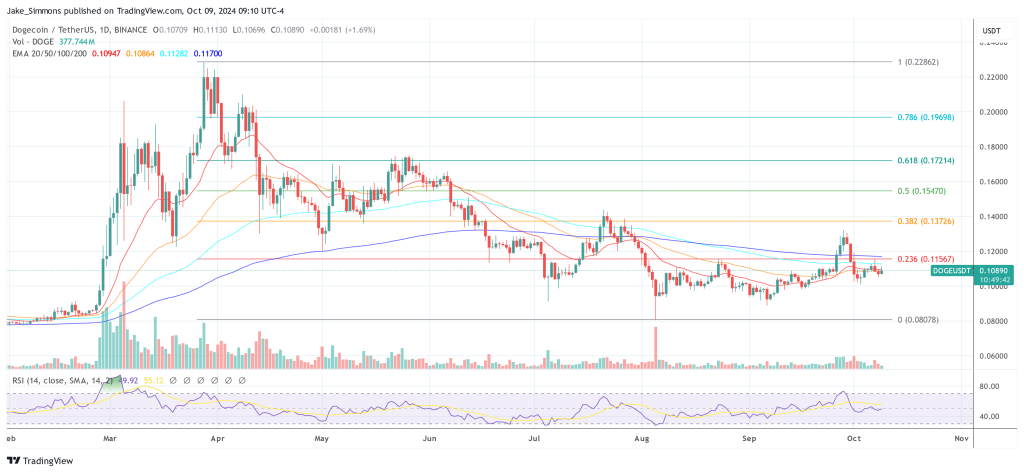The new HBO documentary “Money Electric: The Bitcoin Mystery,” which aired on October 8, has ignited intense debate within the crypto community. The film suggests that Canadian Bitcoin developer Peter Todd is Satoshi Nakamoto. However, Todd himself has publicly denied this identification.
In response to the documentary’s claims, several experts have come forward to debunk the theory proposed by director Cullen Hoback, who based his conclusion on four arguments, as reported by Bitcoinist earlier today. Among those refuting the claim is Billy Markus, co-founder of Dogecoin and known online as Shibetoshi Nakamoto. Taking to X, Markus stated, “It’s not Peter Todd bro.”
When a user asked, “Who’s Peter?”, Markus replied, “Not Satoshi unless you’re an idiot. […] He’s one of the more OG core devs but not the creator.” Another user pressed further, asking, “So who is Satoshi?” Markus responded enigmatically, “Someone who is not alive.”
This hint intensified speculation within the community. Renowned Dogecoin community member Doge Whisperer (@TDogewhisperer) queried further, “If you had to make an educated guess, who would it be?” Markus answered candidly, “Hal Finney and friends.”
hal finney and friends
— Shibetoshi Nakamoto (@BillyM2k) October 9, 2024
Is The Dogecoin Founder Right?
Hal Finney was a renowned computer scientist and cryptographer who was one of the earliest participants in the Bitcoin network. His deep involvement and contributions to cryptography and digital currencies have led some to speculate that he might be Satoshi Nakamoto. There are arguments both supporting and refuting this possibility.
Finney’s early involvement in Bitcoin is notable. He was the recipient of the first Bitcoin transaction ever conducted; Satoshi Nakamoto sent him 10 Bitcoins as a test on January 12, 2009. He was also one of the first people to correspond with Satoshi, providing feedback and suggestions on Bitcoin’s code.
His expertise in cryptography and digital cash is well-established. Finney was a respected cryptographer who worked at the PGP Corporation and was instrumental in the development of Pretty Good Privacy (PGP). In 2004, he developed Reusable Proofs of Work (RPOW), a precursor to Bitcoin that addressed issues of digital scarcity and double-spending.
Some analyses have noted similarities between Finney’s writing style and that of Satoshi Nakamoto, including the use of British English spellings and certain phrases. The tone and technical depth in Finney’s communications mirror those found in Satoshi’s writings. Additionally, Finney lived just a few blocks away from Dorian Satoshi Nakamoto, another individual speculated to be Bitcoin’s creator. This coincidence has led some to theorize that Finney might have adopted the name “Satoshi Nakamoto” from his neighbor.
Overall, Finney had the requisite knowledge to solve the complex problems that Bitcoin addresses, including decentralization, cryptographic security, and consensus mechanisms. As an active member of the cypherpunk mailing list, he was deeply involved in discussions about privacy, cryptography, and digital currencies.
However, there are also arguments suggesting Hal Finney is not Satoshi Nakamoto. Finney consistently denied being Satoshi until his passing in 2014. He maintained that he was merely an early adopter and contributor, and was open about his involvement, sharing email correspondences and Bitcoin wallet information to support his claims.
In August 2009, Finney was diagnosed with amyotrophic lateral sclerosis (ALS). The debilitating nature of the disease would have made it extremely challenging to manage and develop Bitcoin while concealing his identity. As his condition progressed, he lost much of his mobility, which would hinder his ability to maintain the rigorous development schedule that Bitcoin’s early growth required.
Moreover, Finney had documented email conversations with Satoshi Nakamoto, which would be unusual if they were the same person. While some analyses find similarities in their writing styles, others highlight differences in their communication styles as well as programming approaches and conventions.
At press time, Dogecoin traded at $0.1089.












